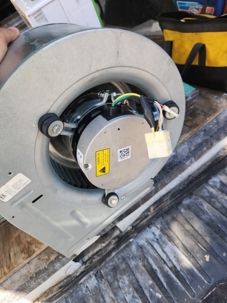Heating, Ventilation, and Air Conditioning (HVAC) systems are essential to maintaining comfort in indoor environments. They play an integral role in regulating temperature, enhancing air quality, and ensuring home comfort. However, when it comes to replacing an HVAC system, it’s vital to be aware of the legal and procedural requirements involved, particularly the need for a permit.
Securing an HVAC replacement permit is crucial to complying with local building codes and ensuring safety during installation. This blog aims to guide homeowners through the process of permit for HVAC replacements, elucidating the steps involved and the common pitfalls to avoid. Understanding this process can save time, money, and potential legal challenges.
Section 1: What is an HVAC Replacement Permit?
An HVAC replacement permit is an official authorization required by local governments before any HVAC system installation or replacement can occur. This permit ensures that the work meets all safety codes and regulations established by local and state authorities.
Local regulations can vary significantly across different regions due to differences in climate, local building codes, and the specific requirements of the governing body.
Importance of Compliance
Following local codes is paramount for several reasons:
Safety: Compliance with these regulations helps prevent accidents related to gas leaks, electrical malfunctions, and other safety hazards.
Efficiency: Proper installation as per regulations ensures optimal HVAC system performance, leading to energy savings and improved efficiency.
Legal Protection: Having the correct permits fortifies a homeowner’s position and can prevent legal complications if property disputes or insurance claims.
Section 2: Why You Need a Permit for HVAC Replacement
Legal Requirements
In most locales, obtaining an HVAC replacement permit is a legal requirement for residential properties. Performing work without it can lead to fines, complications in future property transactions, or issues with homeowners’ insurance.
Benefits of Obtaining a Permit
Securing a permit comes with several advantages:
Ensures Safety and Compliance: A permit means the installation meets all required health and safety codes. This is crucial for homeowners and contractors alike. Engaging a licensed contractor, like Momentum AC & Electric, ensures that the guidelines prescribed by the permit are adhered to.
Protects Property Value: When homes are sold, potential buyers often look for proper documentation regarding HVAC installations. Proper permitting protects property values and can even enhance the resale price.
Facilitates Inspection Processes: Once a permit is secured, local authorities typically perform inspections to ensure compliance at various stages of installation. This proactive step identifies potential issues early on, allowing for timely corrections.
Section 3: The Permit Application Process
Applying for an HVAC replacement permit can be straightforward if homeowners follow the correct steps.
Step-by-Step Guide
Research Local Requirements: Homeowners should start by identifying the specific permit requirements in their locality. Local building department websites or offices typically provide comprehensive guidelines.
Gather Necessary Documentation: Key documents often require:
Contractor Information: Details of the licensed contractor managing the installation.
HVAC Specifications: Information about the new HVAC system, including efficiency ratings and installation plans.
Complete the Application Form: Use the official form provided by your local government. Ensure that all sections are filled out accurately to prevent delays.
Submit the Application and Pay Any Fees: Verify the applicable fees for the permit and submit the application. Some jurisdictions may offer online application processes for convenience.
Section 4: Common Mistakes to Avoid
Homeowners can encounter several pitfalls during the permitting process:
Failing to Check Local Regulations: Each locality may have different requirements. Homeowners should not assume that rules are the same everywhere.
Not Hiring a Licensed Contractor: Engaging an unlicensed contractor can lead to complications in the permitting process. Using a reputable company like Momentum AC & Electric ensures compliance with local codes.
Ignoring Timelines for Permit Approval: Many permit processes take weeks. Homeowners should plan accordingly to avoid delays in their HVAC installation schedules.
Underestimating the Costs Associated with Obtaining Permits: When budgeting for HVAC replacement projects, homeowners should account for the potential costs of permits and inspections.
Section 5: What to Expect After Applying for a Permit
Typical Timeline for Permit Approval
The approval timeline after submission can vary. Depending on local procedures, homeowners should typically expect approval within a few days to several weeks.
Explanation of Inspection Processes
Once the permit is approved, the following steps typically include:
Initial Inspection: Officials may conduct a pre-installation inspection to ensure readiness.
Mid-Installation Inspection: This is often necessary to check on the ongoing project.
Final Inspection: After the installation, a thorough evaluation ensures all work meets local codes.
Potential Scenarios for Rejections and How to Address Them
Applications may be rejected for incomplete information or failure to comply with local codes. Homeowners should carefully review their submissions and ensure that all documents are accurate. If a permit is denied, obtaining feedback from the local authority on rectifying any issues is crucial.
Section 6: FAQs About HVAC Replacement Permits
Do all HVAC replacements require a permit?
In most cases, yes. Any significant work done to HVAC systems usually necessitates a permit. However, minor repairs may not always require one. It is advisable to check local regulations.
How much does an HVAC replacement permit cost?
The cost varies widely based on location and project size, typically from $50 to several hundred. Always budget for this in your overall project costs.
Can I replace my HVAC system without a permit?
Replacing an HVAC system without a permit can result in fines and complications. To ensure legal protection and safety, it is strongly recommended that you follow the permitting process.
What happens if I don’t get a permit for my HVAC replacement?
Not obtaining a permit can lead to repercussions, including fines, complications in selling your home, and possible denial of insurance claims related to the work performed.
Conclusion
Additional Resources
Local Building Departments: Access local government websites for comprehensive guidelines.
Recommended HVAC Contractors: Consult reputable contractors like Momentum AC & Electric for reliable installation services.
Helpful Articles: Look for additional resources on HVAC maintenance and upgrades to enhance the efficiency and longevity of your systems.
For further information, consider contacting your local HVAC authorities or Momentum AC & Electric for trustworthy HVAC solutions.

